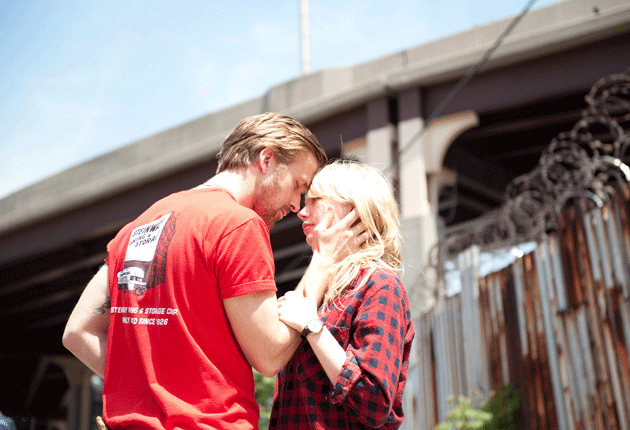Blue Valentine, Derek Cianfrance, 112 mins (15)
This portrait of a strained relationship, which jumps between frazzled present and dazzled past, is absorbing and believable. Enjoy – just don't choose it for a first date...

I'm not being disparaging if I say that Blue Valentine is nothing out of the ordinary.
It's simply a story about a man and a woman – the sort of intimate, unpretentious relationship drama that America's inde-pendent sector used to turn out dependably. But it seems as if American film has altogether lost interest in love's everyday complexities: now, whenever a story is about men and women getting together, it's nearly always in that mummified genre the romcom, as if it were only under cover of facetiousness that film-makers felt confident to approach the topic at all.
In this context, Blue Valentine comes across as, if not a small miracle, at least distinctly refreshing. It depicts a young couple at both ends of their relationship: when they first meet and click, and the moment of breakdown, some seven years later.
We first meet the couple when the rot has set in. Cindy (Michelle Williams) is a nurse in a Pennsylvania medical centre; her husband Dean (Ryan Gosling) works as a house painter, and seemingly has no other pleasure, or ambition, than being a husband and father and having a job that allows him to drink all day. A natural comedian, Dean enjoys a cheeky complicity with their six-year-old daughter – "Let's eat like leopards!" he says, gobbling his food off the tabletop – but his behaviour no longer amuses Cindy. At first, we're likely to warm to Dean's exuberance and take against the apparently entrenched sourness of Cindy, who seems a slave to the reality principle; yet she is the only one of the pair who's remotely facing up to life's routine demands.
As the film zigzags between present and past, we see how the relationship began, but we are left to imagine how it got into this impasse. With everything breaking down, Dean still tries to eke some fun out of the partnership, booking into a ludicrous theme hotel where they spend a night in the "Future Room", a claustrophobically tacky sci-fi B-movie set, all blue light and metal: a painfully ironic choice for a couple that may not have a future.
Six years earlier, Dean – as yet paunch-free and with a rakishly floppy head of hair – is a furniture remover with old-fashioned romantic dreams. He seems to find his ideal when he glimpses Cindy visiting her grandmother, and overcomes her resistance when they meet on a bus, charming her with his garrulous goofball act. Soon, Cindy is telling him a terrible joke – a really, untenably terrible one – and tap-dancing in a shop doorway while Dean serenades her on ukulele. They seem to have it made, although it's ominous – one of the several points at which the film overstates its case – that the song Dean chooses to warble is "You Always Hurt the One You Love". Ain't it the truth ....
Moving between time frames, the film gradually reveals the faultlines on which the relationship may eventually founder. One is Cindy's relationship with her previous boyfriend, lunkish Bobby (Mike Vogel), who doesn't take kindly to being replaced. We also suspect that a starry-eyed dreamer such as Dean may not be best equipped to live with a woman only too well schooled in life's disappointments: Cindy's father, played by John Doman, is a tyrannical specialist in wrecking family dinners (another example of overstatement).
Overall, you feel that director Derek Cianfrance, and co-writers Joey Curtis and Cami Delavigne, are simply making a film about a couple they know and, against all odds, wish the best for. I don't know how Cianfrance worked with his stars Gosling and Williams, but one suspects a certain amount of improvisation in their scenes together. The performances are terrific, the intimacy – emotional and physical – unrestrained and totally convincing, and both leads deserve to be rewarded at tonight's Golden Globes ceremony. The acting is naturalistically low-key – in the case of Ryan Gosling's gently buzzy characterisation, positively low-slung. Michelle Williams spends much of the film's latter-day section wearily frazzled, a lovely muted job of emotional restraint as a woman trying to hold it together. Her characterisation becomes all the richer as we see how Cindy has changed from the cautiously confident young woman with a future. She's lived up to her potential – unlike Dean, who once seemed as if he could do anything, and yet proves happy not to do much at all. Gosling subtly allows Dean's eager, child-like charisma to become, if not soured, then shopworn, played-out.
There's a nice fluidity and detachment to the film, and in the mournfully baroque score by US band Grizzly Bear. Director Derek Cianfrance made a promising debut in 1998 with his rather stylised black-and-white drama Brother Tied. It's taken a long time for him to return with this quietly distinctive, entirely different "second first feature"; let's hope he sticks around this time. I'd place a caveat emptor on Blue Valentine as date viewing, but it's a persuasive and intelligent piece. As marital dramas go, it's not John Cassavetes by a long chalk, but it's film of grit and grace.
Next Week:
Jonathan Romney watches Neds, Peter Mullan's evocation of growing up tough in early Seventies Scotland

Watch Apple TV+ free for 7 day
New subscribers only. £9.99/mo. after free trial. Plan auto-renews until cancelled.
ADVERTISEMENT. If you sign up to this service we will earn commission. This revenue helps to fund journalism across The Independent.

Watch Apple TV+ free for 7 day
New subscribers only. £9.99/mo. after free trial. Plan auto-renews until cancelled.
ADVERTISEMENT. If you sign up to this service we will earn commission. This revenue helps to fund journalism across The Independent.
Join our commenting forum
Join thought-provoking conversations, follow other Independent readers and see their replies
Comments
Bookmark popover
Removed from bookmarks